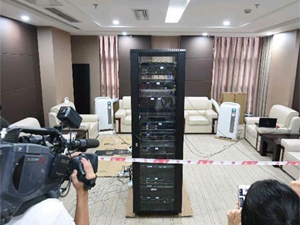



Date:09/06/17
 A robot sat for the math test during China's national college entrance exam, or gaokao, in the southwestern city of Chengdu on Wednesday.
A robot sat for the math test during China's national college entrance exam, or gaokao, in the southwestern city of Chengdu on Wednesday.
The robot, AI-MATHS, consisting of 11 servers, was developed by Chengdu Zhunxingyunxue Technology. It completed two versions of the exam's math test on Wednesday afternoon. There are several versions of the tests in different regions of China.
The robot finished the Beijing test in 22 minutes, scoring 105 points out of 150 points, without Internet support. It scored 100 points on another version of the test.
"It would take two hours for a human to finish the test. I hope next year the machine can improve its performance on logical reasoning and computer algorithms and score over 130," said Lin Hui, the company's CEO.
In February, the robot scored 93 on one math test, slightly higher than the passing grade of 90.
The company participated in a project of China's Ministry of Science and Technology, which plans to develop gaokao robots.
Under the plan, by 2020, AI robots will be smart enough to gain admission to leading universities such as Peking University and Tsinghua University through the entrance exam.
"This is not a make-or-break test for a robot. The aim is to train artificial intelligence to learn the way humans reason and deal with numbers," said Lin
The robot has attempted 12,000 math questions, but an average high school student needs to solve 30,000 questions before taking the gaokao, he said.
AI may be faster than humans in dealing with numbers, but they are not good at processing language.
"For example, the robot had a hard time understanding the words 'students' and 'teachers' on the test and failed to understand the question, so it scored zero for that question," he said.
AI robot takes college entrance math test
 A robot sat for the math test during China's national college entrance exam, or gaokao, in the southwestern city of Chengdu on Wednesday.
A robot sat for the math test during China's national college entrance exam, or gaokao, in the southwestern city of Chengdu on Wednesday.The robot, AI-MATHS, consisting of 11 servers, was developed by Chengdu Zhunxingyunxue Technology. It completed two versions of the exam's math test on Wednesday afternoon. There are several versions of the tests in different regions of China.
The robot finished the Beijing test in 22 minutes, scoring 105 points out of 150 points, without Internet support. It scored 100 points on another version of the test.
"It would take two hours for a human to finish the test. I hope next year the machine can improve its performance on logical reasoning and computer algorithms and score over 130," said Lin Hui, the company's CEO.
In February, the robot scored 93 on one math test, slightly higher than the passing grade of 90.
The company participated in a project of China's Ministry of Science and Technology, which plans to develop gaokao robots.
Under the plan, by 2020, AI robots will be smart enough to gain admission to leading universities such as Peking University and Tsinghua University through the entrance exam.
"This is not a make-or-break test for a robot. The aim is to train artificial intelligence to learn the way humans reason and deal with numbers," said Lin
The robot has attempted 12,000 math questions, but an average high school student needs to solve 30,000 questions before taking the gaokao, he said.
AI may be faster than humans in dealing with numbers, but they are not good at processing language.
"For example, the robot had a hard time understanding the words 'students' and 'teachers' on the test and failed to understand the question, so it scored zero for that question," he said.
Views: 331
©ictnews.az. All rights reserved.Similar news
- Justin Timberlake takes stake in Facebook rival MySpace
- Wills and Kate to promote UK tech sector at Hollywood debate
- 35% of American Adults Own a Smartphone
- How does Azerbaijan use plastic cards?
- Imperial College London given £5.9m grant to research smart cities
- Search and Email Still the Most Popular Online Activities
- Nokia to ship Windows Phone in time for holiday sales
- Internet 'may be changing brains'
- Would-be iPhone buyers still face weeks-long waits
- Under pressure, China company scraps Steve Jobs doll
- Jobs was told anti-poaching idea "likely illegal"
- Angelic "Steve Jobs" loves Android in Taiwan TV ad
- Kinect for Windows gesture sensor launched by Microsoft
- Kindle-wielding Amazon dips toes into physical world
- Video game sales fall ahead of PlayStation Vita launch





















